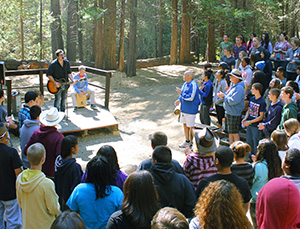The loudspeakers disrupt the peace and quiet, buses and trucks endanger the children, and the town sees no financial benefit.
Those are some of the complaints from the neighbors of Hume New England, a Christian camp in this small town that is expanding its operations and angering its neighbors.
The Monterey Planning Board will meet at 7 p.m. Wednesday in Town Hall to determine what authority, if any, the town has to regulate the proposed development.
“The whole process has been eye-opening and extremely disappointing,” town resident Bettina Schwartz said of the permitting procedure.
As a religious organization, Hume is exempt from Monterey’s bylaws, giving it broad latitude to grow its facilities on its 500 acres on the southeast end of town. The camp only has to go before the Planning Board for site plan review.
Hume New England is the Northeastern home of Hume Lake Christian Camps, one of the largest operators of Christian camps in the world. The organization began its work in 1946 in California, expanding to the south from its home in Fresno to San Diego — and to the east to Monterey.
The Sudan Interior Mission bought the property and developed it in 1929. New England Keswick began a Christian camp on the property in 1941, and Hume bought the camp in 2011.
Neighbors say traffic and noise have increased since Hume took over.
Planning Board Chairwoman Maggie Leonard told The Eagle that she had hoped to use the site plan review on April 6 to force changes on Hume.
She was overruled.
“I thought we could take a more activist approach,” Leonard said. “But my board did not agree with that.”
Without the bylaw exemptions, Hume would have had to apply for a special permit from the town. Schwartz and a number of her neighbors believe that in that case the camp would have been stopped in its tracks.
“If a non-religious camp was attempting to expand to this extent, in this location,” 17 of the camp’s neighbors wrote in a letter to the Planning Board in late March, “the likely response from the town would already have been an emphatic `No.’ ”
Adding to the discontent is the fact that Hume pays no taxes to the town nor does it provide a payment in lieu of taxes, or pilot, which many successful religious and nonprofit institutions of its type do for host communities.
“They don’t contribute to the town coffers,” Leonard said.
Ira Kaplan, a lawyer representing the neighbors, gave a condensed review of his case for a heavily conditioned approval of the site plan on April 6.
He argued that the board’s authority was broad. It has quasi-judicial authority, he said, and can exercise that power in both the creation and interpretation of the law.
“You can put conditions on the plan, you can approve it, you can deny it outright,” Kaplan said.
But most of the board disagreed. Members Stephen Enoch and Larry Klein said they believed that the board’s authority is very narrow on the site plan.
And board member Richard Piepho pointed out that the camp has stood in Monterey since 1941 — far longer, he said, than most of the neighbors’ homes have existed.
In the end, the review passed with four compromise conditions. Construction is only allowed between 7 a.m. and 7 p.m.; the camp will have to restrict its use of loudspeakers to between 9 a.m. and 9 p.m. and limit that use to public announcements that assist with camp operations; the total number of beds in the camp may not exceed the Board of Health’s permit; and Hume must pay for a police detail during construction.
It was that last condition that sparked a division during their follow-up meeting on April 13, Leonard said. The broadness of the condition could be interpreted as the camp hiring a full time detail — but according to Leonard the intention was for the camp to support an officer only during heavy construction days when large vehicles will be traversing narrow and winding Cronk Road.
The road may eventually have to be widened and/or paved to accommodate large vehicles carrying food, campers and supplies. If and when that happens, the town will be on the hook for that repair.
“If they want something like that, if they want this operation, they should make the commitment,” Schwartz said. “We’re a little town.”
But the town’s Highway Superintendent Shawn Tryon told The Eagle that town roads are the responsibility of the public. And anyway, he added, there shouldn’t be restrictions on their use.
“Roads are built for all vehicles,” Tryon said.
But Kaplan said that the board could use its power to maintain the general welfare of the community in respect to the road — and make the camp fix it.

